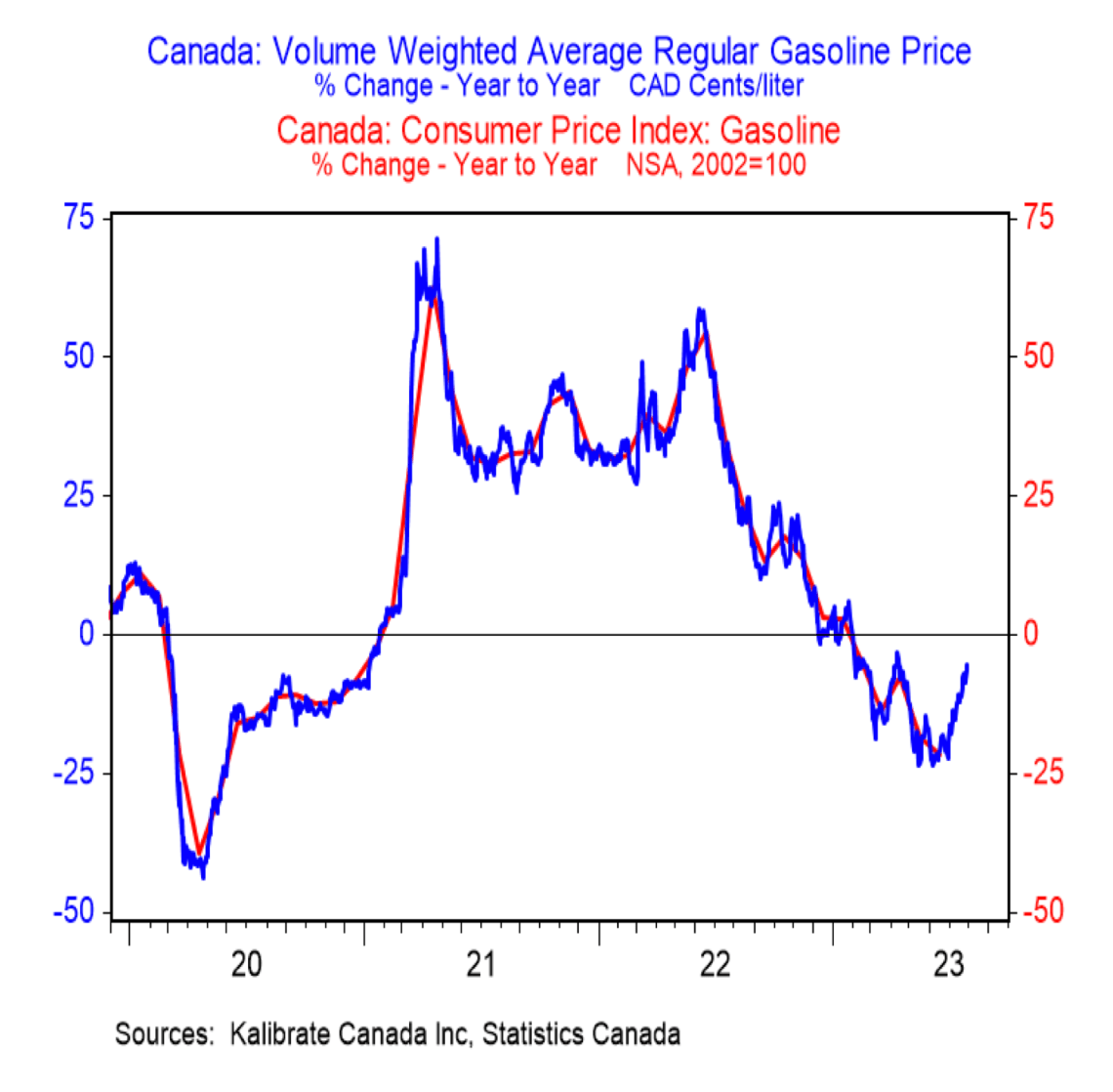Canada’s inflation surge is leaving almost as quickly as it appeared, but it’s not gone yet. BMO Capital Markets wrote to investors this morning, warning the Consumer Price Index (CPI) is about to get a boost from gasoline prices. A base effect that helped to lower the headline CPI growth is about to work in the opposite direction, which will appear as an acceleration of inflation. If the central bank doesn’t navigate the issue carefully, it can turn into an actual problem, requiring higher interest rates.
Base Effects Are Skewed Readings That Can Have A Big Influence
A base effect is a reading that appears stronger than reality. It occurs when an irregular movement in one period skews the reading in another. For example, a mild monthly increase compared to a period that showed a decline a year before, can appear to be big acceleration for annual growth. In reality, it could have just been a delay in behaviour such as a late purchasing season.
It may not sound like a big issue, but it can cause one. The current inflation crisis is partially a result of the Bank of Canada (BoC), amongst other central banks, dismissing rising inflation in 2021, writing it off as a base effect. Consequently, they continued low-rate stimulus. The BIS attributes the global surge in home prices to this misread, since it produced excessive demand for housing.
Canadian Inflation Will Get A Boost From A Gasoline Base Effect
The pandemic resulted in a change in consumer behavior, resulting in multiple base effects. The most recent one helped to produce lower annual growth for CPI, making inflation appear under control faster than it actually is being reeled-in. Since inflation is partially a sentiment-related issue, that’s actually helping the inflationary mindset cool—along with higher interest rates.
BMO warns the rapid deceleration is about to work against sentiment soon. “We are about to find out that so-called base effects can work the other way as well on inflation,” warns Douglas Porter, chief economist at BMO.
Source: BMO Capital Markets.
Porter continues, “After providing a very helpful tailwind in knocking headline inflation down in recent months, the steady back-up in gasoline prices in recent weeks is poised to reverse some of that trend.”
Gasoline showed a contraction of 5% for annual growth at the end of July. A month prior, annual growth showed a 22% decline—which sounds like a massive acceleration. Monthly growth was just 1%, but a 9% monthly decline last July and August, respectively, is producing a base effect, explains BMO.
Canada’s Headline Inflation Will Climb—At Least Temporarily
Gasoline is always a relatively volatile component, being filtered out the central bank’s core CPI. However, headline inflation is likely to climb, potentially hitting the consumer psyche.
“So, unless we get a lot of help from other components, it looks like Canada’s headline inflation rate will push back up in the next few reports, possibly to nearly 3.5%—at least temporarily,” said Porter.
The bank doesn’t expect it to impact the central bank, forecasting headline inflation at 3.3% for the quarter. However, if the central bank isn’t careful, it might be hit with higher oil prices, and fading consumer confidence in its ability to control inflation.
“…the sustained rise in oil (and gasoline) prices to multi-month highs threatens to a) undo a good chunk of the recent moderation of headline inflation, and b) abruptly end the recent “feel-less-bad” story around inflation trends,” he said.


Some healthy growth in CPI and interest rates.
By now almost everyone knows it’s not the central banks who have full control over inflation. Please stop providing more non sense excuses for even further pre cooked non sensical bank interest rate hikes. If that helps we all always have full confidence on what these bully banks can achieve no matter how the economy is doing… .
Banks make less as interest rates rise. Loan volume and size shrinks. It’s much more lucrative to have someone pay loans for their whole life than a much smaller loan with an interest rate that provides incentive to pay off the loan faster.
No need to worry, Statcan has been politically captured. They will just continue to use “hedonics” to lie and downplay the actual rate of inflation. Federal institutions in Canada can’t be trusted.
Another example of the government being the problem,not the cure..
Is BMO saying that carbon tax is bad? Is the author saying that? Then why not say it clearly? Price of gasoline rose because of the misguided eco-policies of the government.
You’re under the impression that a carbon tax in Canada is why oil prices around the world increased by more than 10% in the past 30 days? Biden & Trudeau must be pretty powerful if they’re driving the cost of oil in Singapore higher.
No. That’s not what is being said here. Your confirmation bias is showing. It’s literally just Gas companies wanting more money.
Whats the next excuse
Housing prices MUST stay high to support homeowners
I have faith this government will protect my investment
Unfortunately, your home is an investment. When I put money into the stock market no one is protecting me from losing money. If you decided to purchase a home, this is your reality. The fact that you believe the “government” should protect your investment is ridiculous. The government gets their money from the taxpayer and there is not reason on this earth that the taxpayer should have to bail you out of losing money on your investment. No one has come to my rescue from losing money in the stock market. Wake up. Have you heard of a stop loss?
Government doesn’t care about your equity or your well being. What may happen is intergenerational mortgages same as some other countries. Canada has a workforce that pre plandemic was 30% ready to exit and retire. Inflation has caused those same ppl to dip into retirement savings. Many will postpone retirement and continue working, at a higher tax bracket, to pay for the monumental debt Canada has amassed. Surely it has nothing to do with those that continually virtue signal by sending billions of dollars overseas in aid while our own ppl sleep in tents in the street.
and the moral hazard continues…
and the moral hazard continues…
The base effects from the reduction child care expenses in Ontario and other provinces will also fall off in December this year. It has been a main downward contributor to YoY CPI for months.
Would love to see some analysis on how that reduction has contributed to households abilities to keep up with higher mortgage interest costs.
How much did childcare expenses reduce the CPI, because in reality I didn’t notice any reduction for my expenses.
Opec reduced output. Canada has our own resources. The oil oligopoly dictates how inflation will go coupled with the WEF agenda is a damning cause for BOC to raise interest rates again. This is about crashing the housing market and bankrupting the middle class. Remember, you’ll own nothing and be happy.
OPEC reduced output because half the world is getting discount oil from Russia, and aren’t joining Western sanctions. A surplus to the East isn’t a West, but we’ll struggle to make sense since most of us still don’t get what’s happening.
Who wrote this? Who are they connected with? Who paid them. Follow the money. Enough said
Yeah, BMO is in charge of a shadowy cabal that wants to make less money, so they’re calling higher inflation. When will they be exposed? !
The phrase “base effect” is a garbage term that seems to have been first used by Statistics Canada in its October 2002 CPI update.
There was a big drop in energy prices in October 2001, the month following the 9/11 terrorist atrocities, enough to bring the October 2011 month-to-month inflation rate show a decrease of 0.5%. When this dropped out of the annual inflation rate in October 2002, it shot up from 2.3% in September to 3.2% in October. This should have been called an exit effect, but for some reason StatCan chose to call it a base effect, concentrating on the October 2002 inflation rate being calculated on a lower October 2001 base than the September 2002 base, when this was just an artifact of the exceptional October 2001 monthly inflation rate. The phoniness of this terminology is immediately obvious if you think that there would have been an even stronger jump in inflation if October prices usually rose by 10% but in October 2001 had not moved at all. Then the big exit effect pushing inflation up would have been accompanied by no change in the base at all. For some reason this trashy term has metastasized all over the world since then, as far away as India.
In the context of Canadian inflation, the immediate concern is with the CPI All-items and the vagueness of the post is unhelpful. The 12-month inflation rate that the Bank of Canada targets is based on the product of 12 monthly inflation ratios. When there is a new monthly update, the earliest monthly inflation ratio of the previous annual inflation rate exits the 12-month inflation rate and the monthly inflation ratio for the current month takes its place. In June 2022, there was a monster exit effect in operation as a June 2022 monthly ratio of roughly 1.007 (equivalent to an annualized inflation rate of 8.2%) left the annual inflation rate, to be replaced by a much lower monthly inflation rate for June 2023 of about 1.001 (equivalent to an annualized inflation rate of just 1.5%). So it is fair to note that for the next three months we will have exit effects that will likely tend to boost the annual inflation rate: for July 2022, August 2002 and September 2002, the annualized inflation rates are 1.6%, -3.8% and 0.8% respectively. However, after that, there is another monster positive exit effect, as the October 2022 annualized inflation rate is 9.0%.
It is worth mentioning that the exit effect is compounded if the product of the monthly ratios that remain part of the annual inflation rate from one month to another exhibit a high inflation rate. This is the case for June 2023, since the product of the monthly ratios for the 11-month period from June 2022 to May 2023 is 1.0268, equivalent to an annualized inflation rate of a little more than 2.9%.
While the so-called base effects, which are actually more appropriately called exit effects, are often invoked, they are virtually never precisely defined or measured. However, it is straightforward to do so. To measure the difference between 12-month CPI inflation rates for June 2023 and May 2023, the exit effect is simply the inflation rate for the 11-month period June 2022 to May 2023 less the 12-month inflation rate for May 2023. The entry effect is the residual, but can also be directly calculated as the 12-month inflation rate for June 2023 less the inflation rate for the 11-month period June 2022 to May 2023. The exit effect for June 2023 is -0.68%, and so very much dominates the difference between June 2023 and May 2023 12-month inflation rates, which is -0.55%. The entry effect is just 0.13%.
I am not sure why my previous comment was removed, since it was informative and did not violate any of the stated guidelines.